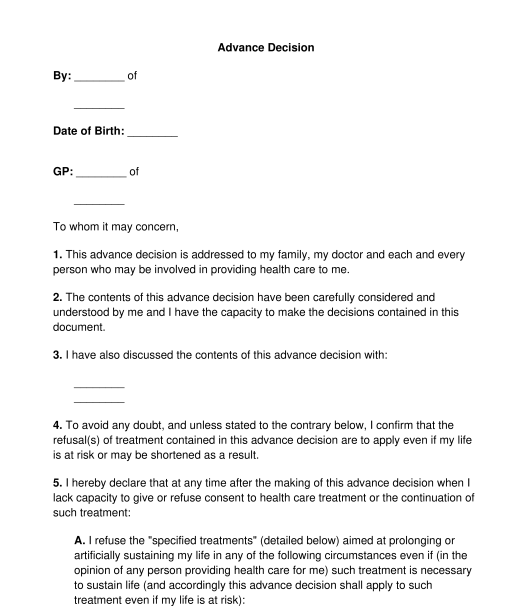 03/09/2025
03/09/2025

Answer a few questions and your document is created automatically.

Your document is ready! You will receive it in Word and PDF formats. You will be able to modify it.

 03/09/2025
03/09/2025
 Word and PDF
Word and PDF
 2 pages
2 pages
An advance decision or advance directive records a person's intentions about future medical decisions to refuse treatment. An advance decision is made whilst a person has capacity, meaning that they are still able to make decisions. An advance decision will specify a person's wishes about refusing medical treatment in the event that they may lack the capacity to make those decisions in the future.
An advance decision is different from a will. A will sets out a person's intentions regarding their financial affairs after they die.
An advance decision or directive deals with a person's wishes to refuse treatment in certain circumstances, in the event that they are unable to make those decisions during their lifetime. Sometimes, this is referred to as a 'living will'.
Under a power of attorney, a person provides the authority for another person to act and make decisions on their behalf:
In contrast, an advance decision sets out a person's future wishes about the refusal of treatment which will come into effect and will be considered by medical professionals in the event that they lose capacity.
No, it is not compulsory to hold a letter of this nature. Without an advance decision, medical professionals (and possibly the Court in the event of a dispute from family members) will be required to make a decision on behalf of the individual.
Capacity refers to the ability of a person to make decisions. A person lacks capacity if they are unable to make decisions for themselves because of an impairment of, or disturbance in the functioning of the mind or brain.
An advance decision should not be used to:
A person can mention preferences about treatment in the decision letter, but these will not be binding in any jurisdiction and may only be taken into account by a medical professional.
Before making an advance decision, it is necessary to check the following:
A person who is over 18 and who has capacity can make an advance decision. Capacity refers to the ability of a person to make decisions.
A person lacks capacity if they are unable to make decisions for themselves because of an impairment of, or disturbance in the functioning of the mind or brain.
An advance decision can be made indefinitely and will continue until death. An advance decision should be reviewed and updated regularly, particularly when a person's circumstances change.
The decision letter should be signed by the decision maker in the presence of a witness. The witness should also sign the letter.
A copy of the final signed letter should be stored and kept in a safe place by the decision maker.
The decision maker's healthcare provider/GP should be provided with a copy
If the person making the advance decision has a lasting power of attorney in England and Wales which refers to an advance decision, an advance decision should be sent to the Office of the Public Guardian (England and Wales).
If the person has a health and welfare power of attorney in Scotland, a person may wish to provide a copy of an advance directive to the Office of the Public Guardian (Scotland).
There is no register in Northern Ireland.
Yes. The decision maker should sign the letter in the presence of a witness. The witness should also sign the letter. The witness should:
In England and Wales, and Northern Ireland, an advance decision can be legally binding.
In Scotland, an advance decision is not legally binding but can be taken into consideration by doctors and medical professionals.
An advance decision should:
The Mental Capacity Act 2005 applies to advance decisions in England and Wales.
The Adults with Incapacity (Scotland) Act 2000 applies to advance directives in Scotland.
The Mental Capacity Act (Northern Ireland) 2016 applies in Northern Ireland.
You fill out a form. The document is created before your eyes as you respond to the questions.
At the end, you receive it in Word and PDF formats. You can modify it and reuse it.
Advance Decision to Refuse Treatment - Sample, template
Country: United Kingdom